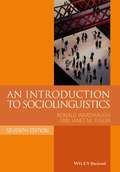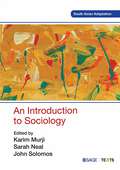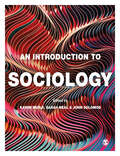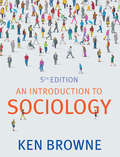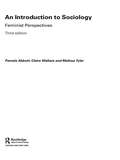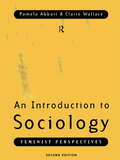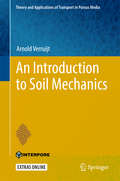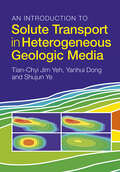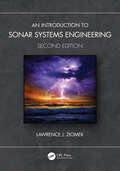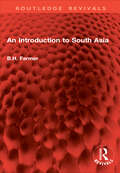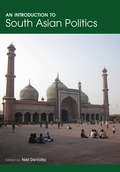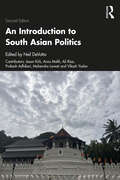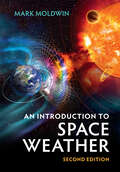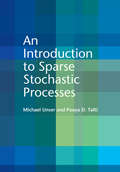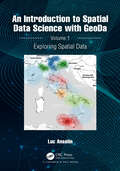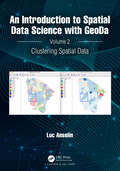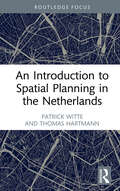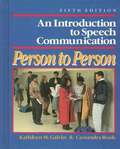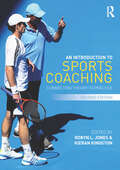- Table View
- List View
An Introduction to Sociolinguistics (Seventh Edition)
by Janet M. Fuller Ronald WardhaughThoroughly updated and revised, An Introduction to Sociolinguistics, 7th Edition presents a comprehensive and fully updated introduction to the study of the relationship between language and society. <p><p> Building on Ronald Wardhaugh’s classic text, co-author Janet Fuller has updated this seventh edition throughout with new discussions exploring language and communities, language and interaction, and sociolinguistic variation, as well as incorporating numerous new exercises and research ideas for today’s students. Taking account of new research from the field, the book explores exciting new perspectives drawn from linguistic anthropology, and includes new chapters on pragmatics, discourse analysis, and sociolinguistics and education. With an emphasis on using examples from languages and cultures around the world, chapters address topics including social and regional dialects, multilingualism, discourse and pragmatics, variation, language in education, and language policy and planning.
An Introduction to Sociology
by Karim Murji John Solomos Sarah NealAn Introduction to Sociology is your essential guide to understanding the social forces that shape our lives and the world around us. This innovative textbook introduces you to the key theories, themes, and concepts in the discipline of sociology and helps you to develop as a sociologist by providing comprehensive coverage of all the main areas of study. Presenting you with the history, current debates and recent research developments for each topic, this book covers everything from classical sociologies and traditional subjects such as class, families, and religion, through to more progressive areas like digital society, social media, migration, and the interconnectedness of modern global society. The book's extensive coverage means it can be used throughout your studies, from first year to final year. Key features: Each chapter is written by an internationally renowned expert who uses specialist insight and the latest research to provide a reliable and up-to-date overview. Includes a selection of unique learning features such as “Hear from the Expert” boxes and “Key Cases” from around the world, as well as reflective activities and revision questions that will enhance your knowledge. Features a section titled “What is sociology useful for?” which includes chapters on the public value of sociology and the role of sociology in contemporary society. The book is supported by a wide-ranging collection of online teaching and learning resources including exclusive video content from SAGE Video, links to SAGE Journal Articles, sample essay questions, and a selection of multiple-choice questions. This definitive text is perfect for first-year sociology undergraduates and anyone studying sociology at university or college level.
An Introduction to Sociology
by Karim Murji John Solomos Sarah NealAn Introduction to Sociology is your essential guide to understanding the social forces that shape our lives and the world around us. This innovative textbook introduces you to the key theories, themes, and concepts in the discipline of sociology and helps you to develop as a sociologist by providing comprehensive coverage of all the main areas of study. Presenting you with the history, current debates and recent research developments for each topic, this book covers everything from classical sociologies and traditional subjects such as class, families, and religion, through to more progressive areas like digital society, social media, migration, and the interconnectedness of modern global society. The book′s extensive coverage means it can be used throughout your studies, from first year to final year. Key features: Each chapter is written by an internationally renowned expert who uses specialist insight and the latest research to provide a reliable and up-to-date overview. Includes a selection of unique learning features such as “Hear from the Expert” boxes and “Key Cases” from around the world, as well as reflective activities and revision questions that will enhance your knowledge. Features a section titled “What is sociology useful for?” which includes chapters on the public value of sociology and the role of sociology in contemporary society. The book is supported by a wide-ranging collection of online teaching and learning resources including exclusive video content from SAGE Video, links to SAGE Journal Articles, sample essay questions, and a selection of multiple-choice questions. This definitive text is perfect for first-year sociology undergraduates and anyone studying sociology at university or college level.
An Introduction to Sociology
by Karim Murji John Solomos Sarah NealAn Introduction to Sociology is your essential guide to understanding the social forces that shape our lives and the world around us. This innovative textbook introduces you to the key theories, themes, and concepts in the discipline of sociology and helps you to develop as a sociologist by providing comprehensive coverage of all the main areas of study. Presenting you with the history, current debates and recent research developments for each topic, this book covers everything from classical sociologies and traditional subjects such as class, families, and religion, through to more progressive areas like digital society, social media, migration, and the interconnectedness of modern global society. The book′s extensive coverage means it can be used throughout your studies, from first year to final year. Key features: Each chapter is written by an internationally renowned expert who uses specialist insight and the latest research to provide a reliable and up-to-date overview. Includes a selection of unique learning features such as “Hear from the Expert” boxes and “Key Cases” from around the world, as well as reflective activities and revision questions that will enhance your knowledge. Features a section titled “What is sociology useful for?” which includes chapters on the public value of sociology and the role of sociology in contemporary society. The book is supported by a wide-ranging collection of online teaching and learning resources including exclusive video content from SAGE Video, links to SAGE Journal Articles, sample essay questions, and a selection of multiple-choice questions. This definitive text is perfect for first-year sociology undergraduates and anyone studying sociology at university or college level.
An Introduction to Sociology
by Ken BrowneThis fifth edition of An Introduction to Sociology provides an accessible and engaging introduction to sociology, without oversimplifying or passing over the important and exciting insights sociology has to offer. Building on the book's existing achievements, Ken Browne has restructured the fifth edition to focus on the core issues in sociology considered in introductory courses. The book covers all the topics and options specified by the GCSE and IGCSE examining boards, including the required classic texts and theoretical perspectives which are helpfully applied throughout the chapters. The new edition has been completely updated to reflect contemporary social changes, including the latest statistics and topical illustrative examples. New material is to be found throughout, such as more extensive treatment of family and household diversity, the marketization of education, social inequality, the control and prevention of crime, and the effects of new media technologies. Carefully designed to support and extend students' learning, a number of features – such as a range of activities, questions and discussion points – add to the book's value as a learning and teaching resource. Explanatory graphics, photographs and cartoons also enliven the text, presenting sociology as an exciting and relevant topic to students of all ages, interests and abilities. The new edition of this highly successful textbook will prove invaluable to anyone first approaching sociology, especially on Access, GCSE and related courses. Students will find the book provides an easy-to-follow and thoughtful introduction to studying sociology.
An Introduction to Sociology: Feminist Perspectives
by Pamela Abbott Claire Wallace Melissa TylerThis third edition of this best-selling book confirms the ongoing centrality of feminist perspectives and research to the sociological enterprise, and introduces students to the wide range of feminist contributions in key areas of sociological concern. Completely revised, this edition includes: new chapters on sexuality and the media additional material on race and ethnicity, disability and the body many new international and comparative examples the influence of theories of globalization and post-colonial studies. In addition, the theoretical elements have also been fully rethought in light of recent developments in social theory. Written by three experienced teachers and examiners, this book gives students of sociology and women's studies an accessible overview of the feminist contribution to all the key areas of sociological concern.
An Introduction to Sociology: Feminist Perspectives
by Pamela Abbott Claire Wallace Melissa TylerThis third edition of this best-selling book confirms the ongoing centrality of feminist perspectives and research to the sociological enterprise, and introduces students to the wide range of feminist contributions in key areas of sociological concern. Completely revised, this edition includes: new chapters on sexuality and the media additional material on race and ethnicity, disability and the body many new international and comparative examples the influence of theories of globalization and post-colonial studies. In addition, the theoretical elements have also been fully rethought in light of recent developments in social theory. Written by three experienced teachers and examiners, this book gives students of sociology and women's studies an accessible overview of the feminist contribution to all the key areas of sociological concern.
An Introduction to Software Design: Concepts, Principles, Methodologies, and Techniques
by Chenglie HuThis textbook provides a balanced coverage on software design, including design principles, methodologies, and techniques in contexts of designing modules of small and larger sizes with a multi-paradigm viewpoint emphasizing design trade-off. Commonly used design diagrams and patterns are also covered in terms of the design ideas behind and their effective use. The book also explores what (software) design thinking is, the role it plays in a design process, and ways to promote it. Despite object orientation being still the center of attention, there is a strong promotion throughout the book that software design should consider all appropriate design paradigms and methodologies.The book is organized in 10 chapters. Chapter 1 is dedicated to an exploration of what software design may be and entail. Next, chapters 2 and 3 are designed to help readers better understand object orientation, and the essentials of object-oriented design. Chapter 4 is then dedicated to the design of methods, while chapters 5, 6, and 8 respectively include topics about the design of objects, modeling with the Unified Modeling Language, and the use of design patterns. Larger software elements are often directly responsible for the formation of software architecture, thus chapter 7 covers four kinds of larger software elements: libraries, components, frameworks, and microservices, and their architectural implications. Chapter 9 finally brings the presentation of software design to an end with a coverage on software architecture focusing on software architectural views. Case studies are important in learning how to design software, hence chapter 10 then gathers some small design case studies that can be used in earlier chapters as appropriate. These case studies can be extended in different ways to provide additional design opportunities.This textbook book is intended for a junior level undergraduate course on software design, yet the depth of the book makes it also appropriate for a design course at beginning graduate level. Professionals may also find the book useful in their professional development.
An Introduction to Soil Mechanics (Theory and Applications of Transport in Porous Media #30)
by Arnold VerruijtThis textbook offers a superb introduction to theoretical and practical soil mechanics. Special attention is given to the risks of failure in civil engineering, and themes covered include stresses in soils, groundwater flow, consolidation, testing of soils, and stability of slopes. Readers will learn the major principles and methods of soil mechanics, and the most important methods of determining soil parameters both in the laboratory and in situ. The basic principles of applied mechanics, that are frequently used, are offered in the appendices. The author's considerable experience of teaching soil mechanics is evident in the many features of the book: it is packed with supportive color illustrations, helpful examples and references. Exercises with answers enable students to self-test their understanding and encourage them to explore further through additional online material. Numerous simple computer programs are provided online as Electronic Supplementary Material. As a soil mechanics textbook, this volume is ideally suited to supporting undergraduate civil engineering students.
An Introduction to Soils for Environmental Professionals
by Duane L. WinegardnerAn Introduction to Soils for Environmental Professionals assembles and presents the basic principles of each of the major soil science fields. It introduces fundamental concepts and shows the interrelationships between the various branches of soil science - from mineralogy to soil physics.
An Introduction to Solute Transport in Heterogeneous Geologic Media
by Tian-Chyi Jim Yeh Yanhui Dong Shujun YeOver the past several decades, analyses of solute migration in aquifers have widely adopted the classical advection-dispersion equation. However, misunderstandings over advection-dispersion concepts, their relationship with the scales of heterogeneity, our observation and interest, and their ensemble mean nature have created furious debates about the concepts' validity. This book provides a unified and comprehensive overview and lucid explanations of the stochastic nature of solute transport processes at different scales. It also presents tools for analyzing solute transport and its uncertainty to meet our needs at different scales. Easy-to-understand physical explanations without complex mathematics make this book an invaluable resource for students, researchers, and professionals performing groundwater quality evaluations, management, and remediation.
An Introduction to Sonar Systems Engineering
by Lawrence J. ZiomekWritten in tutorial style, this textbook discusses the fundamental topics of modern day Sonar Systems Engineering for the analysis and design of both active and passive sonar systems. Included are basic signal design for active sonar systems and understanding underwater acoustic communication signals. Mathematical theory is provided, plus practical design and analysis equations for both passive and active sonar systems. Practical homework problems are included at the end of each chapter and a solutions manual and lecture slides for each chapter are available for adopting professors.
An Introduction to Sonar Systems Engineering
by Lawrence J. ZiomekAn Introduction to Sonar Systems Engineering Second Edition Important topics that are fundamental to the understanding of modern-day sonar systems engineering are featured. Linear, planar, and volume array theory, including near-field and far-field beam patterns, beam steering, and array focusing, are covered. Real-world arrays such as the twin-line planar array and a linear array of triplets, which are solutions to the port/starboard (left/right) ambiguity problem associated with linear towed arrays, are examined in detail. Detailed explanations of the fundamentals of side-looking (side-scan) and synthetic-aperture sonars are presented. Bistatic scattering with moving platforms is explored with derivations of exact solutions for the time delay, time-compression/time-expansion factor, and Doppler shift at a receiver for both the scattered and direct acoustic paths. Time-domain and frequency-domain descriptions, and the design of CW, LFM, and Doppler-invariant HFM pulses, are explained. Target detection in the presence of reverberation and noise is examined. Time-domain and frequency-domain descriptions of MFSK, MQAM, and OFDM underwater acoustic communication signals are also discussed. Although the book is mathematically rigorous, it is written in a tutorial style. Many useful, practical design and analysis equations for both passive and active sonar systems are derived from first principles. No major steps in the derivation of important results are skipped – all assumptions and approximations are clearly stated. Particular attention is paid to the correct units for functions and parameters. Many figures, tables, examples, and practical homework problems at the end of each chapter are included to aid in the understanding of the material covered. New to the Second Edition Chapter 15 Synthetic-Aperture Sonar Chapter 13, Section 13.3, The Rectangular-Envelope HFM Pulse Chapter 10, Section 10.7, Moving Platforms, was rewritten, which allowed for the elimination of Appendix 10C from the first edition New explanations/discussions were added to Subsections 1.2.1 and 1.3.1 in Chapter 1 Appendix 1A was rewritten and the new Table 1A-1 was added to Chapter 1 A solutions manual is available for adopting professors
An Introduction to South Asia (Routledge Revivals)
by B.H. FarmerOriginally published in 1983 and here reissuing the second edition of 1993, An Introduction to South Asia presents the geographical and historical background to the diversities of the region. From the legacy of the colonial period and the controversies that surrounded partition and independence, the book traces the consequences of social divisions, particularly of religion, caste and language, into contemporary politics. Interwoven issues on environments, sociology, politics, and economies combine to explain development patterns and problems, the processes behind them, and the reciprocal impact of South Asia and the wider world.This fully updated second edition provides new material on environmental issues, the causes and consequences of natural disasters, and the role of women in the region. It provides a comprehensive, interdisciplinary guide to the varying environments—natural, social, political, and economic—that characterize South Asia.
An Introduction to South Asian Politics
by Neil DeVottaThis introductory textbook provides students with a fundamental understanding of the social, political, and economic institutions of six South Asian countries: Afghanistan, Bangladesh, India, Nepal, Pakistan, and Sri Lanka. It adopts a broad theoretical framework and evaluates the opportunities and constraints facing South Asia’s states within the context of democracy. Key features include: An introduction to the region. The history and political development of these South Asian states, including evaluations of their democratic trajectories. The management of conflict, economic development, and extremist threats. A comparative analysis of the states. Projections concerning democracy taking into consideration the opportunities and constraints facing these countries. This textbook will be an indispensable teaching tool for courses on South Asia. It includes pedagogical features such as political chronologies, political party descriptions, text boxes, a glossary, and suggestions for further reading. Written in an accessible style and by experts on South Asian politics, it offers students of South Asian politics a valuable introduction to an exceedingly diverse region.
An Introduction to South Asian Politics
by Neil DeVottaThe second edition of this introductory textbook provides students with an overarching understanding of social, political, and economic institutions of six South Asian countries: Afghanistan, Bangladesh, India, Nepal, Pakistan, and Sri Lanka. Using democracy as a prism, it evaluates the varied opportunities and constraints facing these states.Key features include: Introduction to the region The history and development of these South Asian states, including evaluations of their democratic trajectories The management of conflict, economic development, and extremist threats A comparative analysis of the states Projections concerning democracy given evolving challenges The textbook is an indispensable teaching tool for courses on South Asia. It includes pedagogical features such as political chronologies, political party descriptions, text boxes, a glossary, and suggestions for further reading. It is written in an accessible style by country experts, thus offering students of South Asian politics a valuable introduction to an exceedingly diverse and complicated region.
An Introduction to Space Plasma Complexity
by Tom Tien Sun ChangAn Introduction to Space Plasma Complexity considers select examples of complexity phenomena related to observed plasma processes in the space environment, such as those pertaining to the solar corona, the interplanetary medium, and Earth's magnetosphere and ionosphere. This book provides a guided tour of the ideas behind forced and/or self-organized criticality, intermittency, multifractals, and the theory of the dynamic renormalization group, with applications to space plasma complexity. There is much to be explored and studied in this relatively new and developing field. Readers will be able to apply the concepts and methodologies espoused in this introduction to their own research interests and activities.
An Introduction to Space Weather
by Mark MoldwinOur space age technology enables global communication, navigation, and power distribution that has given rise to our 'smart', interconnected and spacefaring world. Much of the infrastructure modern society depends on, to live on Earth and to explore space, is susceptible to space weather storms originating from the Sun. The Second Edition of this introductory textbook is expanded to reflect our increased understanding from more than a dozen scientific missions over the past decade. Updates include discussions of the rapidly expanding commercial space sector, orbital debris and collision hazards, our understanding of solar-terrestrial connections to climate, and the renewed emphasis of human exploration of the Moon and Mars. It provides new learning features to help students understand the science and solve meaningful problems, including some based on real-world data. Each chapter includes learning objectives and supplements that provide descriptions of the science and learning strategies to help students and instructors alike.
An Introduction to Sparse Stochastic Processes
by Michael Unser Pouya D. TaftiProviding a novel approach to sparse stochastic processes, this comprehensive book presents the theory of stochastic processes that are ruled by stochastic differential equations, and that admit a parsimonious representation in a matched wavelet-like basis. Two key themes are the statistical property of infinite divisibility, which leads to two distinct types of behaviour - Gaussian and sparse - and the structural link between linear stochastic processes and spline functions, which is exploited to simplify the mathematical analysis. The core of the book is devoted to investigating sparse processes, including a complete description of their transform-domain statistics. The final part develops practical signal-processing algorithms that are based on these models, with special emphasis on biomedical image reconstruction. This is an ideal reference for graduate students and researchers with an interest in signal/image processing, compressed sensing, approximation theory, machine learning, or statistics.
An Introduction to Spatial Data Science with GeoDa: Volume 1: Exploring Spatial Data
by Luc AnselinThis book is the first in a two-volume series that introduces the field of spatial data science. It offers an accessible overview of the methodology of exploratory spatial data analysis. It also constitutes the definitive user’s guide for the widely adopted GeoDa open-source software for spatial analysis. Leveraging a large number of real-world empirical illustrations, readers will gain an understanding of the main concepts and techniques, using dynamic graphics for thematic mapping, statistical graphing, and, most centrally, the analysis of spatial autocorrelation. Key to this analysis is the concept of local indicators of spatial association, pioneered by the author and recently extended to the analysis of multivariate data.The focus of the book is on intuitive methods to discover interesting patterns in spatial data. It offers a progression from basic data manipulation through description and exploration to the identification of clusters and outliers by means of local spatial autocorrelation analysis. A distinctive approach is to spatialize intrinsically non-spatial methods by means of linking and brushing with a range of map representations, including several that are unique to the GeoDa software. The book also represents the most in-depth treatment of local spatial autocorrelation and its visualization and interpretation by means of GeoDa.The book is intended for readers interested in going beyond simple mapping of geographical data to gain insight into interesting patterns. Some basic familiarity with statistical concepts is assumed, but no previous knowledge of GIS or mapping is required.Key Features:• Includes spatial perspectives on cluster analysis• Focuses on exploring spatial data• Supplemented by extensive support with sample data sets and examples on the GeoDaCenter websiteThis book is both useful as a reference for the software and as a text for students and researchers of spatial data science.Luc Anselin is the Founding Director of the Center for Spatial Data Science at the University of Chicago, where he is also the Stein-Freiler Distinguished Service Professor of Sociology and the College, as well as a member of the Committee on Data Science. He is the creator of the GeoDa software and an active contributor to the PySAL Python open-source software library for spatial analysis. He has written widely on topics dealing with the methodology of spatial data analysis, including his classic 1988 text on Spatial Econometrics. His work has been recognized by many awards, such as his election to the U.S. National Academy of Science and the American Academy of Arts and Science.
An Introduction to Spatial Data Science with GeoDa: Volume 2: Clustering Spatial Data
by Luc AnselinThis book is the second in a two-volume series that introduces the field of spatial data science. It moves beyond pure data exploration to the organization of observations into meaningful groups, i.e., spatial clustering. This constitutes an important component of so-called unsupervised learning, a major aspect of modern machine learning.The distinctive aspects of the book are both to explore ways to spatialize classic clustering methods through linked maps and graphs, as well as the explicit introduction of spatial contiguity constraints into clustering algorithms. Leveraging a large number of real-world empirical illustrations, readers will gain an understanding of the main concepts and techniques and their relative advantages and disadvantages. The book also constitutes the definitive user’s guide for these methods as implemented in the GeoDa open source software for spatial analysis.It is organized into three major parts, dealing with dimension reduction (principal components, multidimensional scaling, stochastic network embedding), classic clustering methods (hierarchical clustering, k-means, k-medians, k-medoids and spectral clustering), and spatially constrained clustering methods (both hierarchical and partitioning). It closes with an assessment of spatial and non-spatial cluster properties.The book is intended for readers interested in going beyond simple mapping of geographical data to gain insight into interesting patterns as expressed in spatial clusters of observations. Familiarity with the material in Volume 1 is assumed, especially the analysis of local spatial autocorrelation and the full range of visualization methods.Luc Anselin is the Founding Director of the Center for Spatial Data Science at the University of Chicago, where he is also Stein-Freiler Distinguished Service Professor of Sociology and the College, as well as a member of the Committee on Data Science. He is the creator of the GeoDa software and an active contributor to the PySAL Python open-source software library for spatial analysis. He has written widely on topics dealing with the methodology of spatial data analysis, including his classic 1988 text on Spatial Econometrics. His work has been recognized by many awards, such as his election to the U.S. National Academy of Science and the American Academy of Arts and Science.
An Introduction to Spatial Planning in the Netherlands
by Thomas Hartmann Patrick WitteThis book provides an introduction to spatial planning in the Netherlands. It explores the academic underpinnings of the discipline and its practical implications, making use of insights on planning practices from the Netherlands. As an academic book with relevance for spatial planning teaching and practice, the relation between planning practice and planning as an academic discipline are discussed. A key analytical concept is introduced to discuss the different dimensions of planning: the planning triangle. This framework helps to bridging the strategic and conceptual elements of planning with its realization. The object, process and context of planning and its relations are discussed. The core of the academic discipline and profession of spatial planning entails looking (far) into the future, stimulating discussion, formulating a desired future direction through an informal and collective planning process and then formalizing and placing current action into that future perspective. In that sense, spatial planning can be understood as the strategic organisation of hopes and expectations. As a study book it is suitable for students of planning at various universities, but also for students in higher professional education. For those involved in the professional field of spatial planning, this book offers a sound foundation.
An Introduction to Special Functions (UNITEXT #102)
by Carlo ViolaThe subjects treated in this book have been especially chosen to represent a bridge connecting the content of a first course on the elementary theory of analytic functions with a rigorous treatment of some of the most important special functions: the Euler gamma function, the Gauss hypergeometric function, and the Kummer confluent hypergeometric function. Such special functions are indispensable tools in "higher calculus" and are frequently encountered in almost all branches of pure and applied mathematics. The only knowledge assumed on the part of the reader is an understanding of basic concepts to the level of an elementary course covering the residue theorem, Cauchy's integral formula, the Taylor and Laurent series expansions, poles and essential singularities, branch points, etc. The book addresses the needs of advanced undergraduate and graduate students in mathematics or physics.
An Introduction to Speech Communication: Person to Person (5th edition)
by Kathleen M. Galvin Cassandra BookThis Fifth Edition comprises eight units and contains topics on communication such as The Communication Process and Inventories, Speaking and Listening, Self as Communicator, Interpersonal Communication, Group Communication, Public Communication, Persuasive Communication and Media Communication.
An Introduction to Sports Coaching: Connecting Theory to Practice
by Kieran Kingston Robyn L. JonesAn Introduction to Sports Coaching provides students with an accessible and engaging guide to the scientific, social scientific, medical and pedagogical theory that underlies the practice of quality sports coaching. Now in a fully updated and revised second edition, it introduces students to the complex, messy, multi-faceted nature of coaching, and explores the full range of 'knowledges' which inform all successful coaching practice. Written by a team of leading international sports coaching academics and practitioners, as well as sport scientists and social scientists, the book provides a concise guide to every key theme in sports coaching, including: Reflective practice Pedagogy Skill acquisition Psychology Biomechanics Physiology Sport medicine and injury Performance analysis Sociology History Philosophy Sport development Each chapter makes a clear link between theory and practice, and includes discussion of real-life coaching scenarios and insights from practising international and club coaches. The book includes clear definitions of important themes and concepts, as well as seminar and review questions in each chapter designed to confirm understanding and encourage further enquiry. No other introductory textbook explains the importance of an holistic approach to sports coaching practice. This is an essential companion to any sports coaching course.
